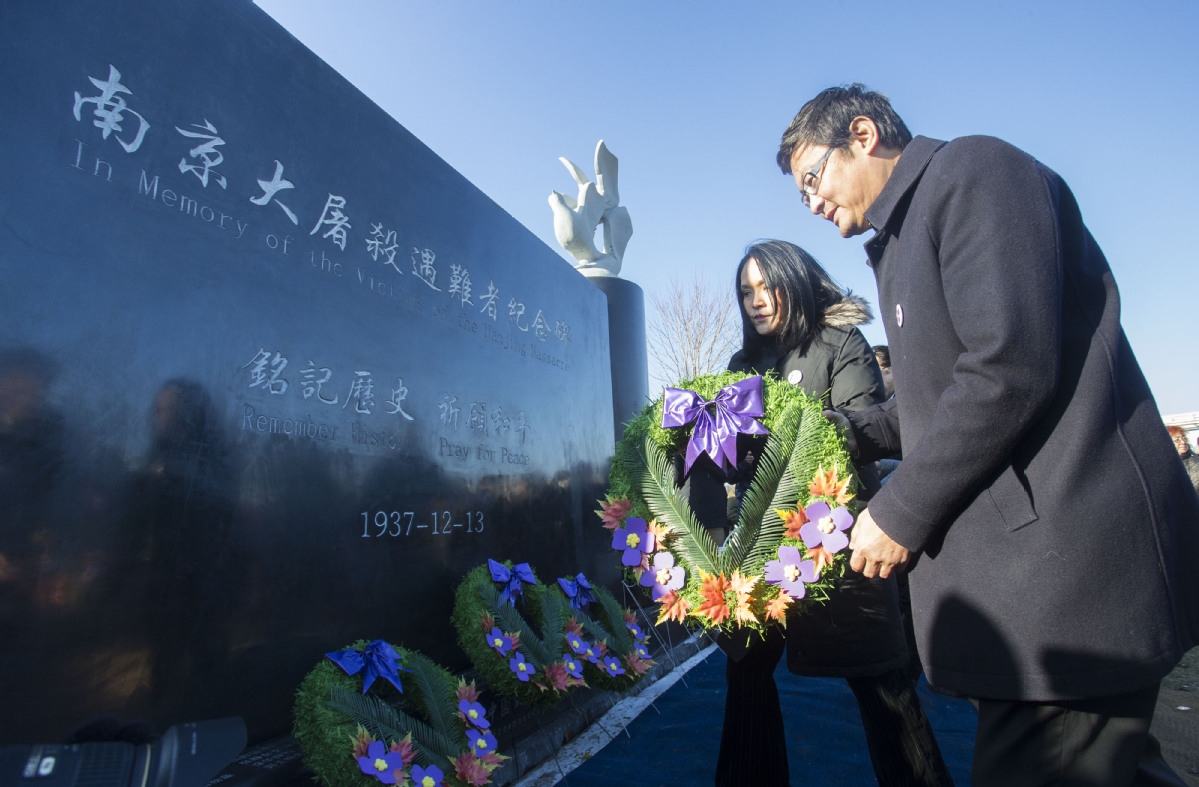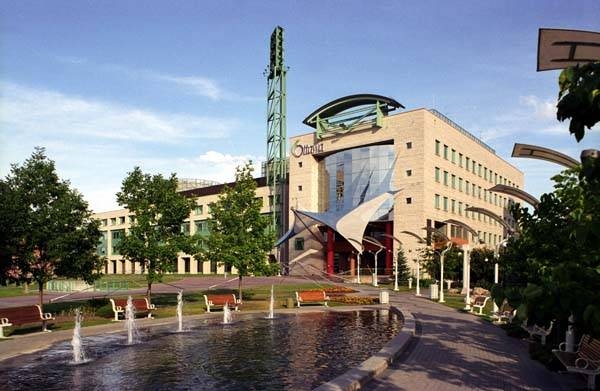
Nanjing Massacre victims not forgotten in Canada on anniversary
Above: MP for Vancouver-Mount Pleasant, Jenny Wai Ching Kwan and Geng Tan, former Liberal MP for Don Valley North and member of the Confederation of Toronto Chinese Canadian Organizations, lay a wreath at the Nanjing Massacre Victims Monument located in Richmond Hill, Ontario. [Photo: Zou Zheng/Xinhua, VIA China Daily.com.cn]
By Rena Li (Toronto)
A memorial ceremony was held in Nanjing, Jiangsu province, on Sunday to mourn the 300,000 victims of the Nanjing Massacre. In 2014, China's top legislature designated December 13 as the National Memorial Day for Nanjing Massacre Victims.
December 13 is a special day for Chinese Canadians in Ontario for a lot of reasons.
The day marks the 83rd anniversary of the Nanjing Massacre; China's seventh National Memorial Day for the victims; the fourth anniversary of Nanjing Massacre Commemorative Day in Ontario; and the third anniversary of the establishment of the Nanjing Massacre Victims Monument in Toronto.
Starting on Dec 13, 1937, the invading Japanese Army captured the city of Nanjing, which was then the capital of China. The lives of 300,000 Chinese civilians and disarmed combatants were brutally wiped out by the Japanese troops in the following six weeks, including an estimated 20,000 to 80,000 women and girls who were raped by the Japanese Army.
But for too long, the Nanjing Massacre has gone unrecognized in the West, and the teaching about the unspeakable tragedy is lacking in schools.
Three years ago, the Ontario Legislature passed Motion 66 — Nanjing Massacre Commemorative Day — proposed by Soo Wong, former member of Provincial Parliament, recognizing every December 13 in Ontario as a day of remembrance for the massacre, the first such commemoration in a Western country.
Wong said it is important for the residents of Ontario, home to the largest Asian community in Canada, to "reflect and educate" about the enduring lessons of the massacre and other World War II atrocities in Asia, as many are unfamiliar with such history.
Wong said the purpose of Motion 66 is to educate and inform.
"We must never forget that during World War II in Asia, Japanese didn't just only attack China, but also many other countries," Wong, who used to be a school board trustee, said in a "History, Culture and Education" webinar on Sunday evening.
"We want to send a message to the international community that when you're doing atrocities and violence, when you're doing evil acts during wartime, we will be educating our public and young people about this," Wong added.
Member of Parliament Jean Yip also gave condolences for those who were killed in the massacre.
"History reminds us to educate ourselves and the next generation so that we can speak out for those who can no longer speak up for themselves. Only then can we ensure that the tragedy of Nanjing will never be repeated," Yip said in the webinar.
"We hope there is no hatred and discrimination, as those are really the root causes of any of the horrible events," said Amanda Collucci, Markham city councillor. "We must remember that as human beings, not (only) between countries; it is really all about humanity."
Cynthia Yu, the webinar organizer, and president of the Hong Maple Foundation, said they also wanted to pay tribute to Iris Chang, the late Chinese American writer.
Chang, a journalist, and author of The Rape of Nanking: The Forgotten Holocaust of World War II, a chronicle of the atrocities committed in that city by occupying Japanese forces, "helped break a six-decade-long international silence on the subject". Chang committed suicide in 2004 at the age of 36.
"Chang independently investigated and studied 20 years ago and published the book, her spirit of 'one person also can change the world' is a model of striving for the Chinese nation's dignity," Yu said. "Affected by her, overseas Chinese and societies have gradually developed a collective consciousness."
Yu said that the atrocities of 83 years ago created wounds in the Chinese nation that are "difficult to heal. The suffering experienced by Chinese predecessors has become the history and memory of the whole nation.
"For today, the most difficult question may not be whether to remember, but how to remember," Yu said. "In past years, the Nanjing Massacre was a repressed individual memory of the victims, a local memory; now, it has become a national memory, and even a world memory."
Liu Cheng, a professor at the Institute for Peace Studies at Nanjing University, who is holder of the UNESCO Chair on Peace Studies, believes that pursuing peace is the best way to heal national trauma.
"The murder of one person against another is a criminal act which will be severely punished by the law, while mass killings in a war cannot be stopped," Liu said. "We should advocate for the international community to stop wars and keep peace forever."
In 1985, Nanjing built the Memorial Hall of the Victims in Nanjing Massacre by Japanese Invaders. In 2017, the United Nations named Nanjing the world's 169th Peace City.
Zhang Sheng, a history professor at Nanjing University, said the establishment of the National Memorial Day and the Memorial Hall have provided a platform for the study and exchange of the nation's holocaust, given that Japanese right-wing groups have denied the history of the massacre for a long time.
"If we are concerned about human rights, we cannot commemorate the Holocaust in the world but ignore the Nanjing Massacre," said Guo Xiaoming, a Chinese Canadian scholar.
Tian Wenxin, a Chinese Canadian from Taiwan, recalled that overseas Chinese had made great contributions to China's resistance against Japanese aggression. They raised money to buy planes to support the Chinese military.
And on the chilly Sunday morning, following social gathering limits during the COVID-19 pandemic, members of the Confederation of Toronto Chinese Canadian Organizations and Chinese Freemasons of Canada (Toronto) remembered and honoured the victims at the Nanjing Massacre Victims Monument north of Toronto.
Engraved with "Remember History, Pray for Peace", the granite black monument was established in December 2018 with donations by Chinese communities in Canada.













